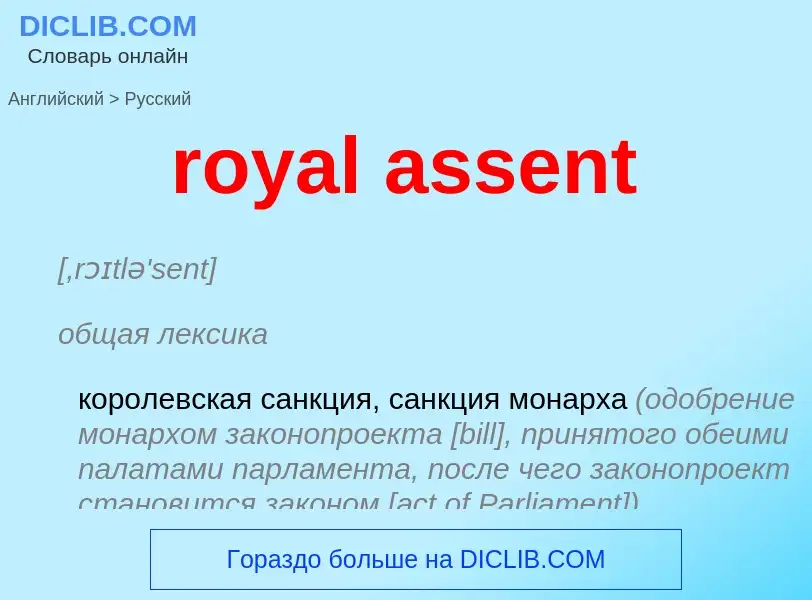Traducción y análisis de palabras por inteligencia artificial ChatGPT
En esta página puede obtener un análisis detallado de una palabra o frase, producido utilizando la mejor tecnología de inteligencia artificial hasta la fecha:
- cómo se usa la palabra
- frecuencia de uso
- se utiliza con más frecuencia en el habla oral o escrita
- opciones de traducción
- ejemplos de uso (varias frases con traducción)
- etimología
Royal assent - traducción al ruso
[,rɔɪtlə'sent]
общая лексика
королевская санкция, санкция монарха (одобрение монархом законопроекта [bill], принятого обеими палатами парламента, после чего законопроект становится законом [act of Parliament])
королевская санкция (одобрение монархом законопроекта)
Definición
Wikipedia

Royal assent is the method by which a monarch formally approves an act of the legislature, either directly or through an official acting on the monarch's behalf. In some jurisdictions, royal assent is equivalent to promulgation, while in others that is a separate step. Under a modern constitutional monarchy, royal assent is considered little more than a formality. Even in nations such as the United Kingdom, Norway, the Netherlands, Liechtenstein and Monaco which still, in theory, permit their monarch to withhold assent to laws, the monarch almost never does so, except in a dire political emergency or on advice of government. While the power to veto by withholding royal assent was once exercised often by European monarchs, such an occurrence has been very rare since the eighteenth century.
Royal assent is typically associated with elaborate ceremony. In the United Kingdom the Sovereign may appear personally in the House of Lords or may appoint Lords Commissioners, who announce that royal assent has been granted at a ceremony held at the Palace of Westminster for this purpose. However, royal assent is usually granted less ceremonially by letters patent. In other nations, such as Australia, the governor-general (as the Monarch's representative) has the right to dissolve the parliament and to sign a bill. In Canada, the governor general may give assent either in person at a ceremony in the Senate or by a written declaration notifying Parliament of their agreement to the bill.


![Henry VIII]] introduced a new method of granting royal assent. Henry VIII]] introduced a new method of granting royal assent.](https://commons.wikimedia.org/wiki/Special:FilePath/Hans Holbein, the Younger, Around 1497-1543 - Portrait of Henry VIII of England - Google Art Project.jpg?width=200)
![Usher of the Black Rod]] in 2009. Black Rod is a key element of the Royal Assent ceremony in Canada as in Britain. Usher of the Black Rod]] in 2009. Black Rod is a key element of the Royal Assent ceremony in Canada as in Britain.](https://commons.wikimedia.org/wiki/Special:FilePath/Kevin MacLeod in Canadian Senate Chamber 2009.jpg?width=200)
![Start of the parchment roll of the [[Reform Act 1832]], with the clerk's record of the royal assent of King [[William IV]] written above the bill, reading in full ''Le Roy le Veult. Soit baillé aux Seigneurs. A cette Bille avecque des amendemens les Seigneurs sont assentuz. A ces Amendemens les Communes sont assentuz.'' Start of the parchment roll of the [[Reform Act 1832]], with the clerk's record of the royal assent of King [[William IV]] written above the bill, reading in full ''Le Roy le Veult. Soit baillé aux Seigneurs. A cette Bille avecque des amendemens les Seigneurs sont assentuz. A ces Amendemens les Communes sont assentuz.''](https://commons.wikimedia.org/wiki/Special:FilePath/Reform Act 1832 First Page.jpg?width=200)
